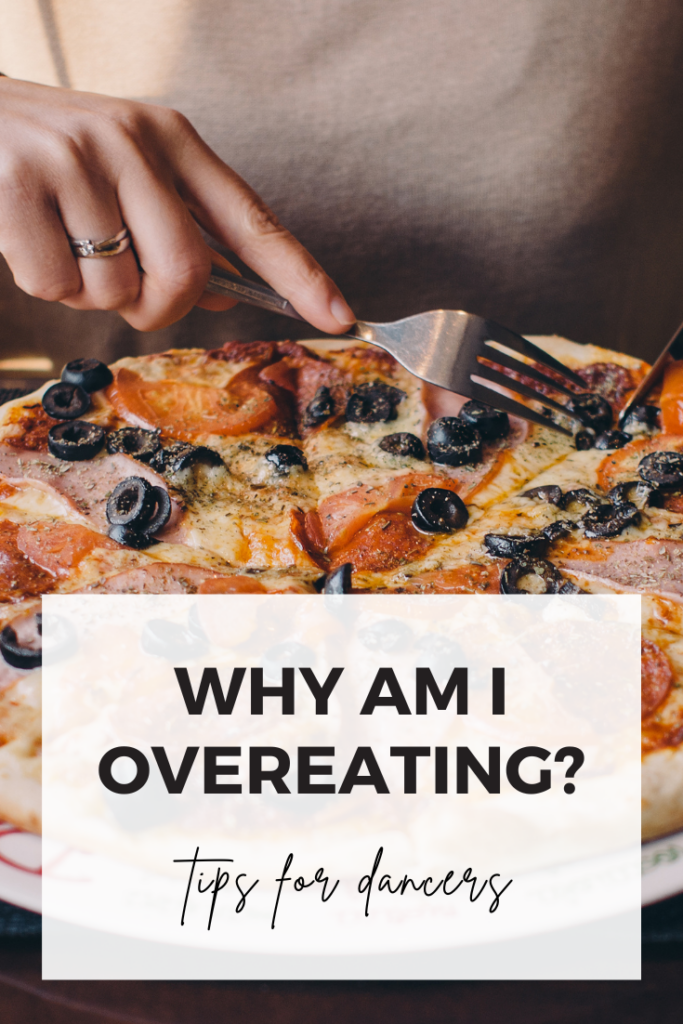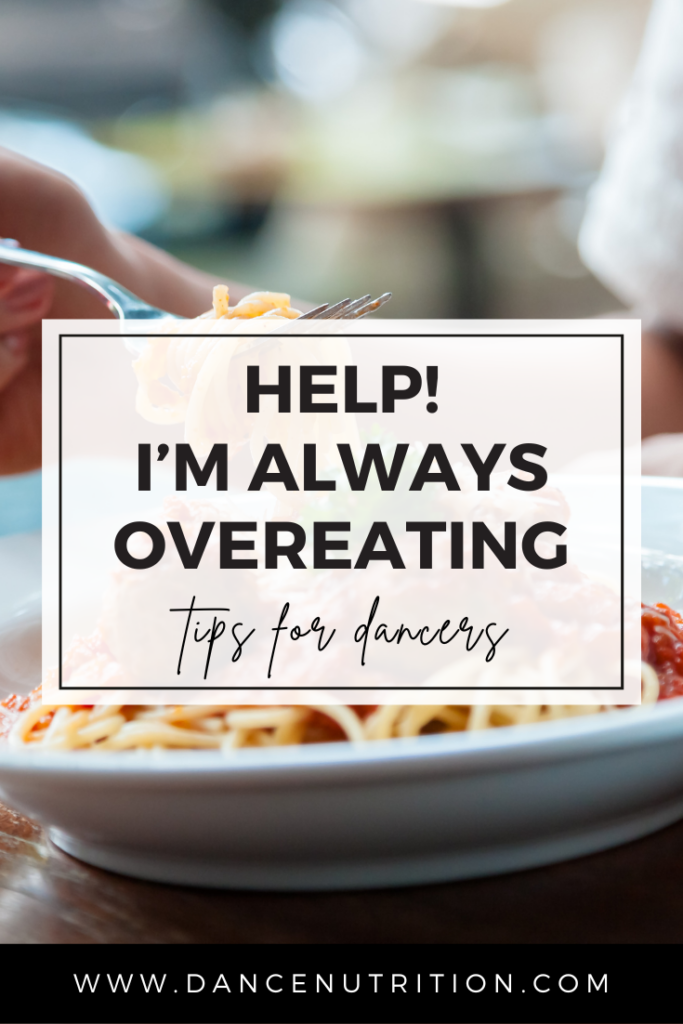Why Dancers Overeat and What You Can Do About It
If you’re reading this, chances are you’ve eaten past the point of fullness. Maybe during a post-show dinner, backstage between rehearsals, or while unwinding after a long day. You were full, but something kept you eating. Then came the guilt.
If you’re a dancer who feels stuck in a loop of “good” days and “bad” nights, know this: you are not doing anything wrong. You’re likely underfed, overtrained, and emotionally taxed. This article will help you understand why dancers “over-eat,” how that differs from binge eating, and how to stop swinging between feeling extremely in control and completely out of control around food. Spoiler: the answer is rebuilding trust with your body.
Overeating vs. Binge Eating: What’s the Difference?
While they may feel similar, “over”-eating is not the same as Binge Eating Disorder (BED), which is a diagnosable, life-threatening mental health condition. BED is characterized by:
- Recurring episodes of eating significantly more food than typical in a short period (about 2 hours).
- Eating very quickly and to the point of physical discomfort.
- A sense of loss of control during the episode.
- Eating alone due to embarrassment.
- Intense shame, guilt, or sadness afterward.
- No regular use of compensatory behaviors (ie. purging or over-exercise).
BED involves behaviors known to isolate and harm an individual’s well-being. If any of this sounds familiar, please seek support. The National Eating Disorders Association (NEDA) Helpline is a great place to start.
What Does It Mean to “Over”-Eat?
You’ll notice I put “over” in quotes. That’s because what feels like “too much” food is often just enough for your body, but dancer diet culture has skewed your ability to recognize it. This is because unfortunitely, dieting and restrictive eating are normalized.
Dancers have unique nutritional needs. You burn significant energy in classes, rehearsals, and performances. But most dancers chronically underestimate how much fuel they need, so what one might label as “over-eating”-eating could be their body trying to catch up.
Why Am I “Over”-Eating?
To stop “over”-eating, we need to understand what’s driving it. Often, the root cause is deprivation— not just physical, but mental and emotional too. For some, it’s the use of food as a tool to soothe during times of emotional distress. Regardless, two helpful questions to consider when identifying your reason for “over”-eating is: (1) am I using food to soothe and (2) is there an identifiable point of deprivation that could be exacerbating this behavior? Here are the three most common forms of deprivation that lead dancers to “over-eat:”
#1: Biological Deprivation
You’re simply not eating enough to meet your energy needs. If you’ve tried to “eat clean,” “cut carbs,” or follow portion-controlled plans that don’t meet your caloric needs, your body eventually pushes back as a normal biological response to replenish the energy not provided earlier.
Example: You skip lunch before a double rehearsal block. Afterward, you’re ravenous and find yourself inhaling a box of granola bars on the train ride home. This isn’t a lack of willpower, it’s your body making up for the deficit.
#2: Psychological Deprivation
You may allow yourself food physically, but restrict it mentally— labeling certain foods as “bad,” “junk,” or “not dancer-friendly.” This increases obsession and intensifies cravings.
Example: You avoid the post-show pizza party because you’re “being good.” A few hours later, you find yourself eating mindlessly in front of the pantry at home. Your brain didn’t get the satisfaction it craved, so now it’s rebelling.
#3: Anticipated Deprivation
This is the classic “Monday reset” mindset. You plan for future restrictions, which makes the present moment feel like a last chance to eat freely.
Example: You plan to get “back on track” after your birthday weekend, so Friday night turns into an unintentional binge. You didn’t fail your plan— your plan set you up for failure.
But I’ve Stopped Dieting. Why Am I Still Overeating?
It could be a few reasons. Deprivation isn’t always intentional. The three examples above represent deliberate restriction. However, sometimes life happens, your schedule intensifies, and you encounter times when eating becomes an afterthought. Say your rehearsal lasts longer than expected. You didn’t plan snacks, and eventually, “over-eat”-eat at your next meal. Simply enjoying your food is another reason some eat past fullness, along with emotional eating. Food insecurity is another possibility— when food is not or will not be accessible for a prolonged period.
For those who have intentionally restricted, just stopping the diet doesn’t instantly fix the damage. Your body still needs to restore trust. After years of restriction, your hunger cues become dysregulated, and your brain may still see certain foods as forbidden, even if you consciously say otherwise. This is your body in a state of recovery, not sabotage. It’s protecting you. When we engage in disordered eating, our body rebels as a means to survive the energy deficit. An uptick in hunger hormones, shifts in cravings, and relentless food thoughts, among others, ensue. At this point, despite feeling physically full and perhaps not even needing more energy, these same mechanisms remain. You no longer want to restrict yourself, you just want to eat.
Diet Culture’s Role in the Overeating Cycle
Diet culture teaches dancers that “over-eating”-eating is a failure of willpower. But willpower has nothing to do with it. It’s not a character flaw— it’s a natural response to restriction.
The very diets that promise unrealistic body goals, performance benefits, and “control” often lead to compulsive eating. The cycle looks like this: Restrict →Deprive → Overeat → Feel guilty → Start restricting again. We’ve heard this rhetoric before… here are a few articles that dive into topics of which diet culture utilizes the idea of willpower to shift the blame from diet to dieter:
How Do I Stop “Over”-Eating?
Attempting to limit, “moderate”, or willpower away your inner rebel will only cause it to linger for longer. Deprivation is your point of intervention, not willpower. The fact is this: you don’t need more discipline. You need more permission.
Start by ensuring that you’re eating enough (here’s an article to learn more about calories for dancers). A licensed dietitian can help you create a plan that consists of multiple meals and snacks spaced throughout your classes and rehearsals. A few ideas to get started?
- A solid breakfast.
- Balanced meals with carbs, protein, and fat.
- Snacks every 2–4 hours during long training days (tip: keep non-perishable snacks in your dance bag—trail mix, granola bars, crackers with nut butter).
From there, challenge food rules. Explore the possibility of a lingering dieting mentality. Might some foods (typically those not deemed “clean”) still feel “off limits?” Perhaps you’re still underestimating the amount of food your body needs in a day. Or, maybe your “cravings” aren’t such a bad thing, but rather, your body signaling its need for more carb-rich foods. With this work comes the practice of unconditional permission. Rather than fighting this inner rebel, use it to build your body of evidence (read more about The Healthy Dancer® Body of Evidence here). This is where working with a licensed dietitian becomes incredibly helpful.
How Can I Recover From Eating “Too Much”?
Step 1: Get Comfortable
If you’re physically uncomfortable, work to gain comfort. This does not mean that you’re “starting over” tomorrow. It also doesn’t mean that you have to make up for those extra calories with an additional workout. Instead, focus on digestion and blood flow with these techniques:
- Gentle movement (light stretching, yoga, breathing techniques, and foam rolling )
- Putting on loose, comfy clothing.
- Prioritize hydration and a gently structured, balanced meal plan.
This isn’t punishment— it’s self-care.
Step 2: Reflect Without Judging
Utilize this time for reflection and discovery. Reflect on the experience, outline a plan (maybe this means stocking a few extra snacks in your bag!), and if needed, seek a professional for more help. Start by asking yourself:
- Was I underfed earlier today?
- Did I restrict this food in the past?
- Was I coping with stress, boredom, or fatigue?
Tip: Keep a Food and Mood Journal. It’s not to track calories, but to notice patterns with curiosity, not shame.
Step 3: Move On
Your next meal is not a chance to “compensate.” It’s an opportunity to return to balance. Your body will guide you there.




